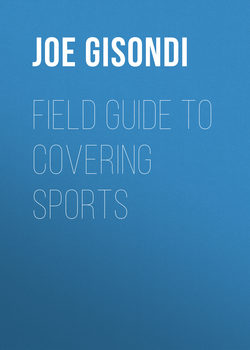Читать книгу Field Guide to Covering Sports - Joe Gisondi - Страница 38
На сайте Литреса книга снята с продажи.
And Keep Asking
ОглавлениеAs I’ve already repeated several times, the best questions come from listening. Think, What did the person just say? Then, What’s interesting about it? and What else would you like to know? Get beyond the basic questions and beyond familiar, popular sources whom everyone interviews.
▸ Follow up. Let’s say a tennis player tells you she served well. You might ask follow-up questions like these: What about the serves felt particularly good? Had she been concerned about serves before the match? If a player says her opponent played better, ask for details. She played better in what way? With returns, footwork, serves? Whatever answer she gives, follow up by asking for more information on that specific area.
▸ Then follow up some more. Coaches say their pitchers threw perfectly, their runners were fatigued, and their team was stale. What do all these adjectives mean? Did the pitcher mix it up better by throwing more off-speed pitches on 1–2 counts? Check with the catcher as well. Were the cross-country runners tired because several were up late with an illness or because they ran three races in 10 days? Find out the reasons behind the statements. Follow-up questions usually yield more specific information and interesting stories. You won’t be far into your sports-writing career before you’ll read or see in another journalist’s story a great detail missing from yours. If you ask the source why he didn’t tell you that, here’s the answer you’ll almost always get: “Because you didn’t ask.”
▸ Speak with opposing teams. A forward can discuss the play of a goalie. A midfielder can assess the play of an opposing forward or midfielder. How does the other team’s linebacker rate this team’s running back? How nasty is your school’s softball pitcher’s riser? Get these other points of view.
▸ Ask sources to define unfamiliar terms. If you don’t know what Fartlek training is, ask the cross-country coach to explain. If you don’t know what a nickel package is, ask the football coach. They may appreciate that you want to understand the topic in more detail—and you’ll be spared the embarrassment of having an error turn up under your byline. Of course, the more research you do in advance, the less likely you’ll have to bother an interviewee with basic questions.
▸ Check and recheck. You’re not a stenographer, mindlessly scribbling down whatever anybody says. Question anything that is unclear, unfamiliar, or unverified. Start with the basics, like the spelling of names. John or Jon? Sarah or Sara? Before the game starts, ask team managers or assistant coaches to review the program to ensure names are spelled correctly. Often, particularly at high school and youth sports events, they are not.
▸ Play fair. If someone makes an accusation about another player or coach, go directly to that other person to get a response. People should get the opportunity to defend themselves—immediately, not days later.
▸ Build trust. If someone tells you in advance that a statement is off the record and you agree, keep your word. Don’t report it. Ever. Even if someone doesn’t stop to say “off the record,” you don’t have to report every foul-mouthed comment made by frustrated coaches or players after a game. Allow athletes who’ve just spent hours competing to have their cathartic moments. Usually these don’t have real news value anyway. In time, if you show judgment and discretion, coaches will trust you more, knowing they can speak more candidly about more important issues.
▸ Talk with people in person. Kate Harman, who writes for the Philadelphia Inquirer’s @RallyPhilly high school sports section, prefers to sit and talk with people featured in longer pieces for at least 20 to 30 minutes. She doesn’t like to interview through text messaging.
▸ Balance the usual with the unusual. Every team has go-to sources, players, or coaches who are usually ready with a lively quote or colorful sound bite. When you’re pressed for time and desperate for info, it’s important to know who these people are. But look, too, for the quiet types, the ones who analyze intelligently but need more encouragement to speak. The best players are not always the best talkers.
Sports Insider: On Citing Information
Our policy is clear. We strive not to use any material from a source unless it is critical to the story and there is no other way to get it. We do not use any information other than the facts. So a quote like, “This deal will help reshape his image,” would not be used because it’s opinion. But “the deal is worth $150 million over five years” would be fact.
I had one case where to use source material for a story would endanger a particular source. This was a person I rely on heavily, and I determined the value of the story did not outweigh value of the source. So I sat on that one. I cannot think under any circumstances, or hardly any, that you would do anything to jeopardize a source—because if you are willing to jeopardize a source, you must not think much of him or her to begin with. And if that’s the case, there would seem to be some trust missing. And if trust is missing, how reliable is the source in the first place? Sacred ground we’re talking about here.
Doug Ferguson,golf writer, Associated Press
